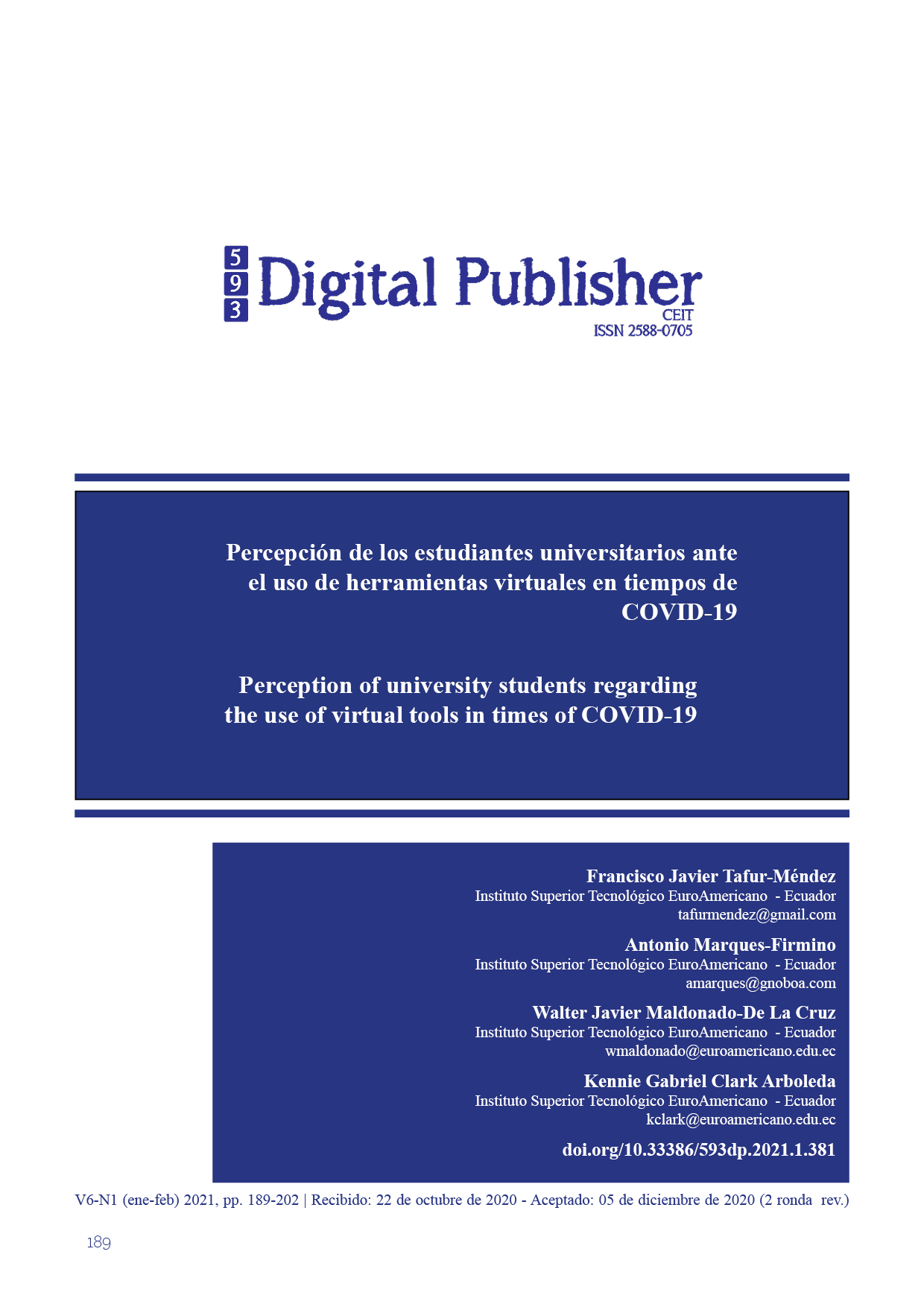Impact of digital education tools (ICTs) training sessions on EuroAmericano Technological Institute student’s behavior.
Main Article Content
Abstract
During the COVID-19 pandemic, several drastic changes have taken place y in social activities and human interaction. Mainly in Education.
This led to mistrust and certain resistance from students, this in part, to the transition from in-class tuition to online education. The unfamiliar scenario, the lack of training in different platforms and learning management systems, and the rediscovering of the NICTs. This gives way to the focus of this article leading to evidence in student behavioral change when utilizing new technological tools and identification of the underlying causes for the reluctance to a seamless use of tools is needed in order to upgrade or update the current resources and teaching methodology to suit the current context.
Taking into consideration the factors that were evaluated in this study (Ortega, 2018, as cited in Hernández, Fernández and Baptista, 2010) a quantitative, exploratory and descriptive research model was carried out, since it is necessary to use a structured technique with established variables that are aligned to the problem. For this reason, the empirical approach was used for this research using two surveys directed at students during the training process in relation to virtual tools and platforms, so that information could be obtained and analyzed to find different solutions to the problem.
At the end of this study, several factors associated to student’s resistance to change were uncovered along with conditions that may create a broader sense of trust and motivation in them, thus, avoiding student desertion.
Downloads
Article Details

This work is licensed under a Creative Commons Attribution-NonCommercial-ShareAlike 4.0 International License.
1. Derechos de autor
Las obras que se publican en 593 Digital Publisher CEIT están sujetas a los siguientes términos:
1.1. 593 Digital Publisher CEIT, conserva los derechos patrimoniales (copyright) de las obras publicadas, favorece y permite la reutilización de las mismas bajo la licencia Licencia Creative Commons 4.0 de Reconocimiento-NoComercial-CompartirIgual 4.0, por lo cual se pueden copiar, usar, difundir, transmitir y exponer públicamente, siempre que:
1.1.a. Se cite la autoría y fuente original de su publicación (revista, editorial, URL).
1.1.b. No se usen para fines comerciales u onerosos.
1.1.c. Se mencione la existencia y especificaciones de esta licencia de uso.
References
Al, A., Ismail, A., Abunasser, F., & Alqahtani, R. (2020). Distance education as a response to pandemics: Coronavirus and Arab culture. Technology in Society, 101317.
Almaraz, A. J. L. (2020). Ventajas de la tecnología. Con-Ciencia Serrana Boletín Científico de la Escuela Preparatoria Ixtlahuaco, 2(4), 31-32.
Alvarado, M. A. C. (2019). Educación virtual y recursos educativos.
Alvarez, R., Moya, D., & Cruz, L. (2016). Aspectos Básicos sobre la Educación en Línea y la Cobertura de Internet en las Zonas de Influencia del Instituto Tecnolóligo Superior Almirante Illingworth. Revista de Investigación, Formación y Desarrollo: Generando Productividad Institucional, 3(1), 11-11.
Aretio, L. G. (2017). Educación a distancia y virtual: calidad, disrupción, aprendizajes adaptativo y móvil. RIED. Revista Iberoamericana de Educación a Distancia, 20(2), 9-25.
Bacigalupe, M. D. L. A. (2020). Los estudios del comportamiento humano en la construcción de la neurociencia educacional. INTERdisciplina, 8(22), 223-245.
Belostecinic, G., Serotila, I., & Duca, M. (2020, July). Perspectives on the Future of Higher Education. In International Conference on Management Science and Engineering Management (pp. 778-790). Springer, Cham.
Cacheiro, M, Cristina, Sánchez, M. & González J. (2016). Recursos tecnológicos en contextos educativos. Editorial UNED.
Canal, J. F. (2018). Ventajas y amenazas del uso de las TIC en el ámbito educativo. Rappoport, S. (2018). Debates y prácticas para la mejora de la Calidad de la Educación. Guadalajara: Asociación Investigación, Formación y Desarrollo de Proyectos Educativos. 123 pp., 67.
Diaz Cabrera, C. Z. (2019). Hábitos de estudio y rendimiento académico de los estudiantes del primer ciclo académico de la FIME-UNAC 2017.
Galindo, D., García, L., Sánchez, R. G., Flores, P. G., Cerrito, P. C. H., Acosta, M. L., ... & Arellano, C. I. M. (2020). Recomendaciones didácticas para adaptarse a la enseñanza remota de emergencia. Revista Digital Universitaria, 21(5).
González, L. G. (2018) El bajo rendimiento escolar y los hábitos de estudiantes en línea. Revista Iberoamericana de Ciencias, 5(6), 209-218.
Moraga, A. B. (2020). Factores que determinan la motivación por aprender en estudiantes universitarios. Revista Electrónica de Conocimientos, Saberes y Prácticas, 3(1), 19-27.
Páramo Morales, D. (2017). Cultura y comportamiento humano. Pensamiento & gestión, (43), 1-5.
Perez Arevalo, R., Reyes Schade, E., & Sanjuan Buitrago, A. (2020). Afectaciones de las medidas de aislamiento social a la enseñanza y aprendizaje universitario, en tiempos del nuevo coronavirus (covid19) en Colombia.
Picón, G. A., de Caballero, K. G., & Paredes, N. (2020). Desempeño y formación docente en competencias digitales en clases no presenciales durante la pandemia COVID-19.
Rodríguez, J. M. (2020). Cambio tecnológico y adaptación de la oferta educativa a la nueva demanda de habilidades en el Uruguay.
Serrano Pastor, R. M., & Casanova López, O. (2018). Recursos tecnológicos y educativos destinados al enfoque pedagógico Flipped Learning.
Sucre, F., & Garrett, M. B. (2016). Educación basada en competencias en línea: Lecciones de EE. UU. para América Latina.
Torres, I., & Sacoto, F. (2020). Localising an asset-based COVID-19 response in Ecuador. The Lancet, 395(10233), 1339.
Carranza Alcántar M.R. y Caldera Montes J.F. (2017). Percepción de los Estudiantes sobre el Aprendizaje Significativo y Estrategias de Enseñanza en el Blended Learning. REICE. Revista Iberoamericana sobre Calidad, Eficacia y Cambio en Educación 2018, 16(1), 73-88
Sánchez Oviedo, E. J. (2019). Las herramientas virtuales y su influencia en los procesos de reclutamiento y selección de personal en las medianas empresas de Lima, en el año 2015.
Chalela Naffah, S., Valencia Arias, A., Bermúdez Hernández, J., & Ortega Rojas, C. M. (2016). Percepciones estudiantiles acerca del uso de nuevas tecnologías en instituciones de Educación Superior en Medellín. Revista Lasallista de investigación, 13(2), 151-162.
Bedregal-Alpaca, Norka, Cornejo-Aparicio, Víctor, Tupacyupanqui-Jaén, Doris, & Flores-Silva, Sidanelia. (2019). Evaluación de la percepción estudiantil en relación al uso de la plataforma Moodle desde la perspectiva del TAM. Ingeniare. Revista chilena de ingeniería, 27(4), 707-718. https://dx.doi.org/10.4067/S0718-33052019000400707
Capilla, M. M., Torres, J. M. T., & Sánchez, F. R. (2016). Percepción del profesorado y alumnado universitario ante las posibilidades que ofrecen las TIC en su integración en el proceso educativo: reflexiones, experiencias e investigación en la Facultad de educación de Granada. Edmetic, 5(1), 113-142.
Padilla, S. (2018). Usos y actitudes de los formadores de docentes ante las TIC. Entre lo recomendable y la realidad de las aulas. Apertura (Guadalajara, Jal.), 10(1), 132-148. https://doi.org/10.32870/ap.v10n1.1107
Chaves, E., Trujillo, J. M., & López, J. A. (2015). Autorregulación del aprendizaje en entornos personales de aprendizaje en el Grado de Educación Primaria de la Universidad de Granada, España. Formación universitaria, 8(4), 63-76.
Vargas, G. (2019). Competencias digitales y su integración con herramientas tecnológicas en educación superior. Cuadernos Hospital de Clínicas, 60(1), 88-94. Recuperado en 27 de noviembre de 2020, de http://www.scielo.org.bo/scielo.php?script=sci_arttext&pid=S1652-67762019000100013&lng=es&tlng=es.
Granda, L., Espinoza, E. & Mayon Espinoza, S. (2019). ICT as didactic tools of the teaching-learning process. Conrado, 15(66), 104-110. Epub 02 de marzo de 2019. Recuperado en 27 de noviembre de 2020, de http://scielo.sld.cu/scielo.php?script=sci_arttext&pid=S1990-86442019000100104&lng=es&tlng=en.




